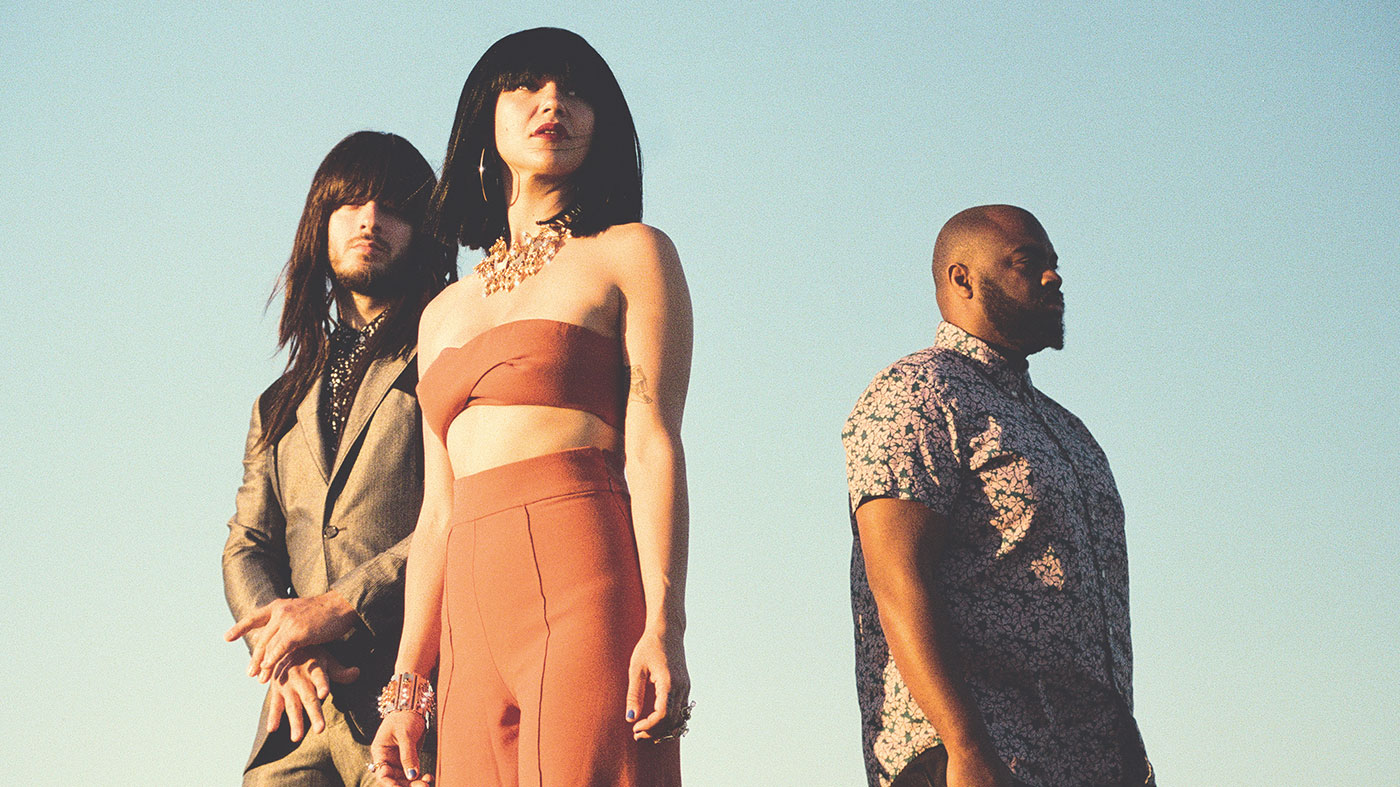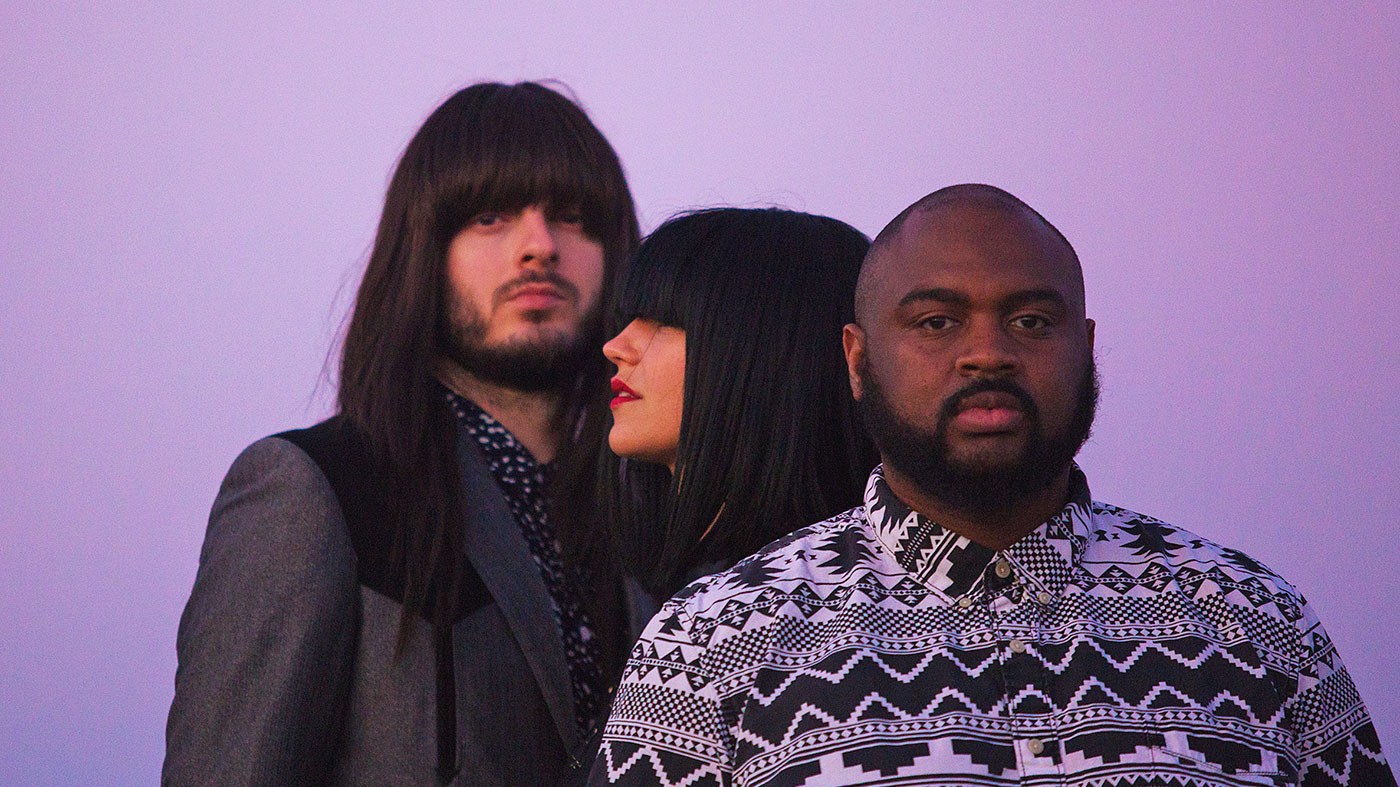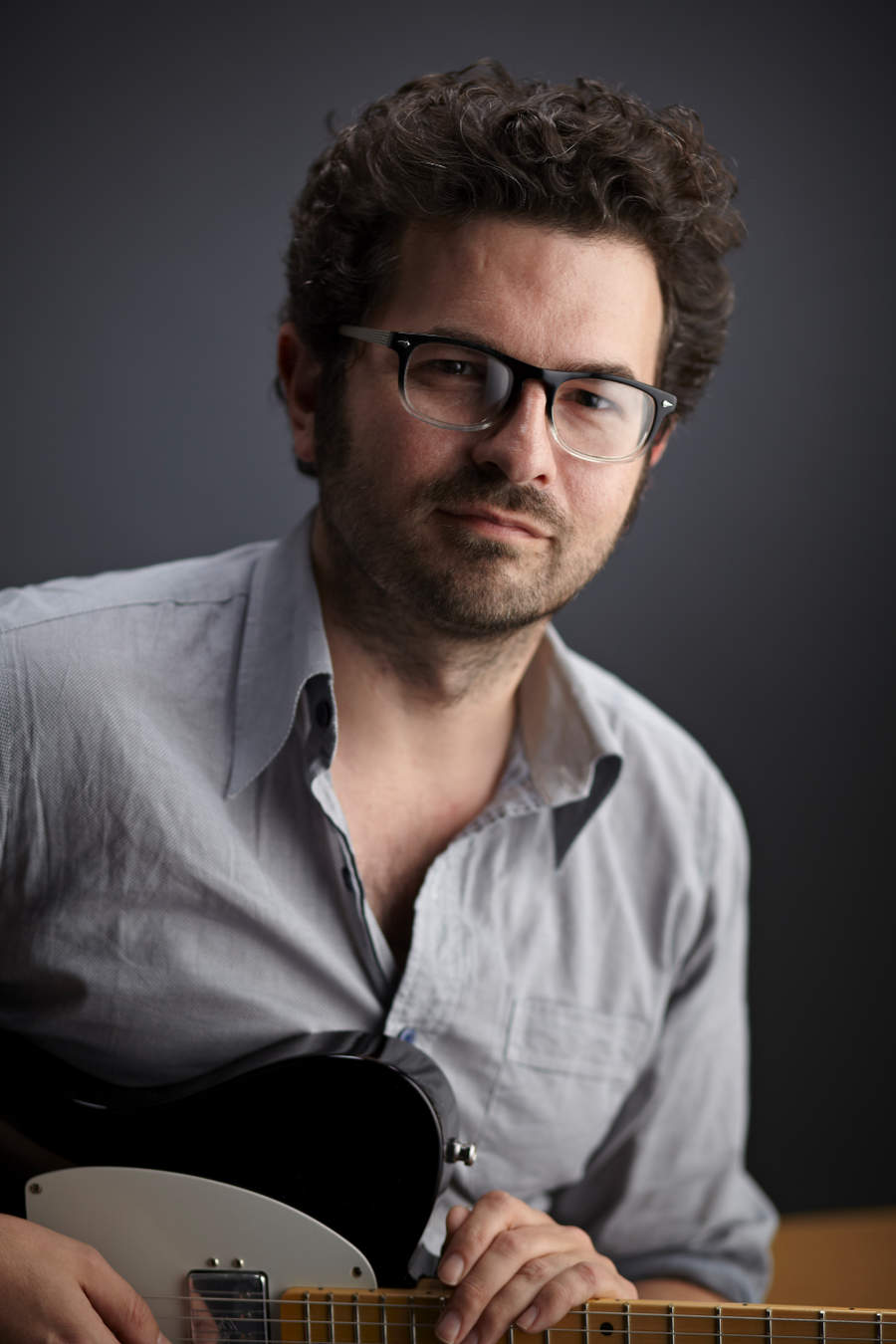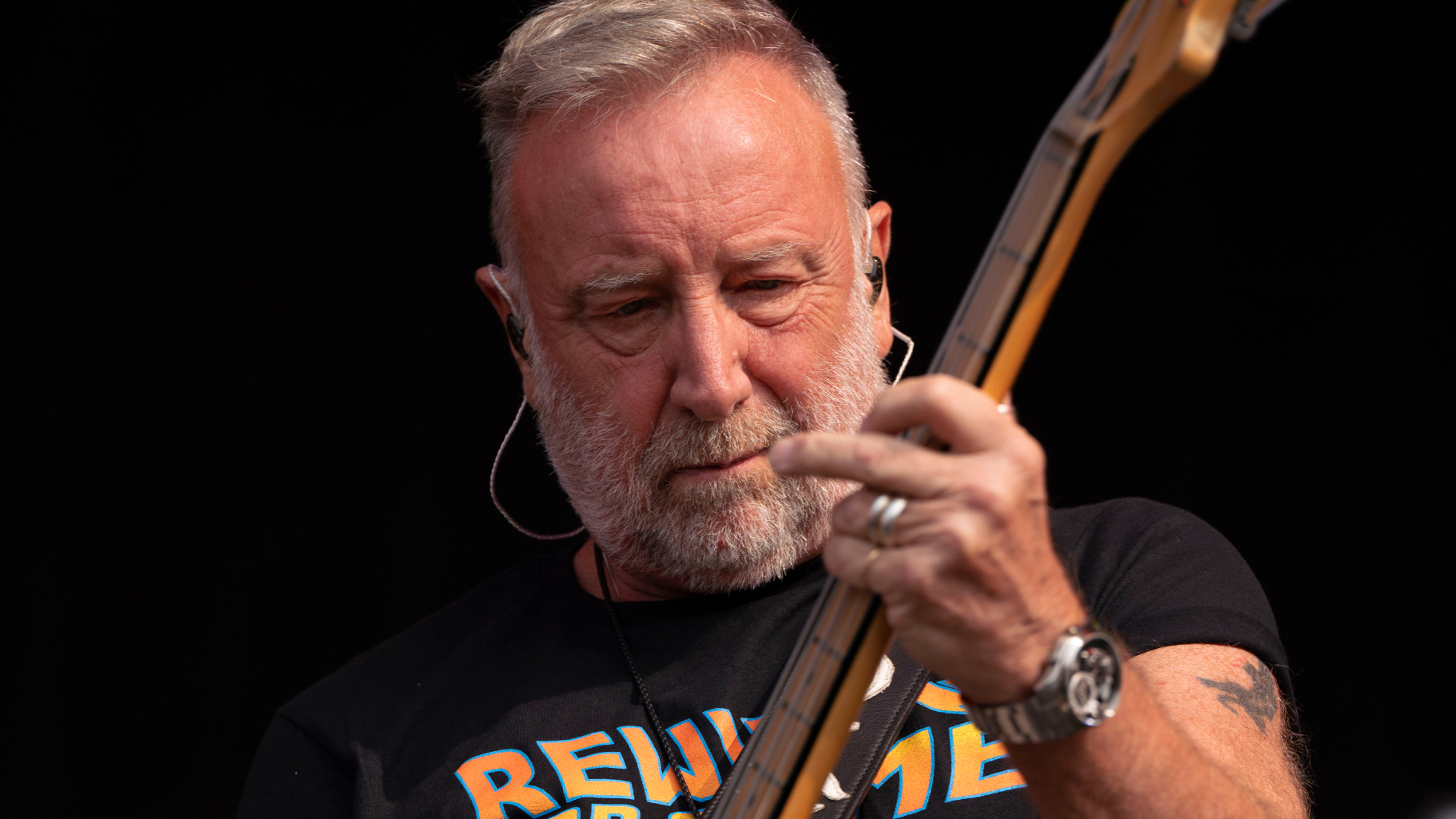Khruangbin: “We’re not intending to create war with our music… It’s the absence of that aggression that a lot of rock bands have”
We talk to the Thai-inspired Texans

With guitar tones from the Link Wray school of rebel surf music and exotic melodies that open the door to entire continents of music, Texan trio Khruangbin are one of the most serenely atmospheric guitar bands we’ve heard in a while. We meet them to find out how a cattle barn became essential to their sound – and why The Shadows are unlikely heroes of world music…
Funky, peaceful, soulful, mysterious… It’s not so much a dictionary you need to describe Khruangbin’s music but a thesaurus, so diverse are the band’s inspirations. Though the band hails from Houston, Texas, there’s hardly a minor pentatonic lick in sight – yet there’s lots of soul in their music all the same.
Maybe it’s the absence of that aggression that a lot of rock bands have... I just want to make music that feels good
If you combine the reverb-immersed twang of The Ventures with a heady cocktail of melodic influences from as far afield as Suriname, you’re some way to understanding this band’s appeal. It’s been a while since we’ve been so excited by impeccably tasteful R&B basslines such as those played by bassist Laura Lee on standout Khruangbin tracks such as Maria Tembién, or the intricate yet funky melodic riffs of Strat-wielding guitarist Mark Speer.
The name Khruangbin comes from the Thai word for aeroplane and it’s an apt choice for the band, who are nomads crossing the vast map of the world’s musical traditions. We meet them to find out who on Earth they think they are…
You guys met through church music originally, is that correct?
Laura Lee: “Mark and DJ [Donald Johnson, drums] played in church for a decade, I think. A gospel church. I met Mark through a mutual friend and he was watching a documentary on music from Afghanistan and I was studying art from that area. I was really intrigued by him and was excited to meet somebody who had the same interests as I did, so we became instant friends. He and DJ had church rehearsal every Tuesday. They would always go to probably the only actual pub in Houston – called Rudyard’s – after rehearsal. After I met Mark, I started crashing their Tuesday night hangout [laughs]. The three of us had burgers and beers for three years before we ever started a band.”
There’s a real sense of space and serenity in your music that reminds us of tracks like Fleetwood Mac’s Albatross at times…
Get the MusicRadar Newsletter
Want all the hottest music and gear news, reviews, deals, features and more, direct to your inbox? Sign up here.
Mark Speer: “We’re not intending to create war with our music… Maybe it’s the absence of that aggression that a lot of rock bands have that are trying to be louder or more hardcore than the last one. That’s not our intention. I just want to make music that feels good.”
LL: “We made music in a barn in the middle of nowhere, and I think the sense of space out there is definitely a peaceful thing. That space comes through in the music – there’s a calming aspect that probably resonates as being peaceful.”
Vocal player
Mark, your guitar lines combine soulfulness with some more exotic flavours. Do you try to channel non-Western instruments in your playing?
MS: “Yeah, definitely. I’m trying to make it sound like a voice or like an instrument that’s made out of a gourd, or something that has skin on it, as opposed to just like wood and pickups.
I’m trying to make it sound like a voice or like an instrument that’s made out of a gourd, or something that has skin on it
“One of my favourite instruments is the Afghan rabab. That has an amazing sound. Nothing else sounds like it. It has this really human quality to it, because I guess the resonant cavity is kind of shaped similar to a person’s [vocal cords]. But aside from that, I grew up with a lot of classical guitar and really loved that style. The Spanish and Brazilian composers and the way that swings – it’d slow down or speed up and there’s just something very emotive about it. So I’m usually trying to emulate vocalists and non-guitar instruments.
“I try to listen to as much as I can from everywhere. Like Southeast Asia: Vietnam, Thailand, Cambodia. Those places have a strong surf guitar thing in their musical DNA. Which seems a little odd at first, but it actually comes through The Shadows because they did one of the first world tours – even before The Beatles did. And everywhere The Shadows stopped off, the youth who had seen them started getting electric guitars and playing the music they had heard, but mixing it with music they already knew from their particular region.
“You hear that in Southeast Asia, you hear it in the Middle East, you hear it in Africa and you hear it especially in Turkey. But a lot of it came from The Shadows, who went on that tour and started a movement. What we do is kind of the same thing, except it’s taking world music that was influenced by The Shadows and bringing it back around to what we do. Also, there are African countries like the Congo – one of my favourite guitar players is a Congolese guy called Franco Luambo. That dude’s absolutely amazing. I also love Spanish guitar. You couldn’t have guitar without Spain. Not gonna happen. I also can’t get enough French Antilles music in my life… All kinds of music.”

Texan non-blues
Texas stands for blues guitar to most of the world – did you feel like a misfit, coming from that particular background?
MS: “I guess, but at the same time, I’m in Houston and Houston is an international city. The people I grew up with weren’t like blues guys. I think the closest thing I got to playing blues was playing zydeco [a Louisiana music style], but that’s not blues music, either; it’s accordion-led. The role that I played was very similar to just rhythm guitar and it sounds a lot like fast reggae or ska. But it’s not Jamaican, it’s like Louisiana music.”
Laura, your bass playing is always impeccably ‘in the pocket’, to coin a phrase. How did you develop that fine sense of economy and groove?
Houston is an international city. The people I grew up with weren’t like blues guys
LL: “I learned how to play bass to dub-reggae records. Mark would put on Scientist records for me to play along to and led me on my bass journey. They’re really simple basslines, but they’re really melodic and super in-the-pocket. It’s just feel-based music, so I think that’s probably where most of it comes from. I love Serge Gainsbourg – all the basslines in his music are really beautiful and I like the texture of them. And obviously James Jamerson and Paul McCartney. But I think my bass playing is definitely dub-influenced. Whenever I listen to those records it sounds like me.”
Laura’s bass seems to provide the melodic backbone of Khruangbin music, with Mark embellishing over the top. How do you write together?
MS: “Usually, it starts off with a drum loop, maybe some breakbeats or something that I’ve found in different places on different records. And then I send those to Laura Lee and she’ll make up something and send it back to me. I’ll clean it up a little bit and play over it, then send it back and then she’ll be like ‘Yes’, or ‘No’… Then we’ll send it back to DJ and see what he thinks and then he does his thing over it. We build it, step by step. The very first thing that ever happens is the bassline, though. The bassline and basically just melodies. I’m kind of playing counterpoint to that.”
A Calf Born In Winter
Tell us about A Calf Born In Winter – it seems to be the song that really turns people on to Khruangbin if they haven’t encountered your music before…
LL: “Mark has an Arabic keyboard…”
MS: “I bought it in Dubai or Bahrain. It’s like a Casio, but you can change the scale, so you can tune the scale to whatever regional scale that you want in that part of the world.”
I’m not doing a whole lot, but what I was playing just sort of sat [right] with it
LL: “Yeah, he played a line on the Casio and then looped it and just had it playing in the barn. This was in a really, really early Khruangbin session and it was just Mark and me. He had it looping and I just played bass along to it. I’m not doing a whole lot, but what I was playing just sort of sat [right] with it. Then Mark played drums to it and it was a really organic, beautiful thing that happened.
“When we tried to record it properly it was difficult to get [the samples] to loop in time with the drums. We had some sort of issue with it, so we decided we had to put the loop on after the fact. As it happened, I was moving to London so we had only 36 hours to get as much material recorded as humanly possible before I left – and that was the last song we were able to record. Mark was so unhappy with it; he was in a real mood. We had to break out the tequila afterwards to make everything okay!
“But I remember that I was in London by the time it was all mixed and I got it sent to me. I was on the Underground, experiencing that first few weeks of living in a big city and being packed like sardines, and I had A Calf Born In Winter playing and it was just… I mean, I cried. It was the best moment I had being on the Tube – but hearing the barn. It was beautiful. It somehow worked out.
“The other lovely part of the story was that there was a pregnant cow during the session and I was obsessed with her because she was huge. The man who takes care of the cows on the property told me that if she gave birth to a girl, he would name the cow Laura Lee. And the cow was a girl and she’s named after me. I felt like I was reborn spiritually when that album happened – because I became a musician with it. It’s a really important song to me.”

Buzz lightly
You both get really warm, vintage sounds out of your instruments that are a huge part of Khrangbin’s musical personality. What are your rigs like?
LL: “I have such a simple rig, so it’ll be really easy. I play an SX bass, which is a Chinese brand that is a knockoff Fender jazz bass. I use no pedals, generally – sometimes just a Keeley limiter/ compressor. I play through a Fender Bassman 10 and that’s it.”
MS: “She’s had the same strings on there for like eight years [laughs].”
How about you, Mark?
They’d be like, ‘Why’s your guitar buzzing?’ and I’d be like, ‘It’s an electric guitar, that’s what it does!’
MS: “Mine’s a little bit more involved, but it’s still pretty simple as far as guitar rigs go. I have a Fender Strat that I’ve had since 2001. It is a 2001 70s reissue with the big headstock and the natural finish body with flatwounds on it. It goes into a Dunlop Cry Baby Wah and then that goes into a Boss DS-1. Sometimes, I have a Boss phaser on the ’board as well. That goes into an MXR Dyna Comp, a little miniature one, and then that goes into an Electro-Harmonix Holy Grail reverb pedal, then into a Strymon El Capistan delay, and then that goes into my amp, which is a ‘Silverface’ Fender Deluxe Reverb.”
We noticed you use rail-type, singlecoil size humbuckers in your Strat. We wouldn’t have guessed that from the old-school tones you get from it…
MS: “Yes, I first put one of those on because I was doing a lot of sessions in Houston. Usually, [with] independent hip-hop producers who were making stuff in their garage, or whatever – it’s not like a shielded studio, so there’d be all this noise and they’d be like, ‘Why’s your guitar buzzing?’ and I’d be like, ‘It’s an electric guitar, that’s what it does!’ So I had to go ahead and put some pickups in it there that didn’t buzz, and that’s the whole reason I started using them. I didn’t need a humbucker sound - I didn’t really care, to be honest – I just wanted to be able to get more work, essentially.”
LL: “That’s my favourite comment from Mark. Sometimes at a venue the sound guy will sort of be angry at me for my bass making a noise - and Mark will just look at him and be like, ‘It’s an electric guitar, it buzzes. That’s what it does.’ [laughs]”
MS: “They’ve been doing that since 1950 - it’s like… relax [laughs].”
Jamie Dickson is Editor-in-Chief of Guitarist magazine, Britain's best-selling and longest-running monthly for guitar players. He started his career at the Daily Telegraph in London, where his first assignment was interviewing blue-eyed soul legend Robert Palmer, going on to become a full-time author on music, writing for benchmark references such as 1001 Albums You Must Hear Before You Die and Dorling Kindersley's How To Play Guitar Step By Step. He joined Guitarist in 2011 and since then it has been his privilege to interview everyone from B.B. King to St. Vincent for Guitarist's readers, while sharing insights into scores of historic guitars, from Rory Gallagher's '61 Strat to the first Martin D-28 ever made.
“I oversaw every element - not just the music and the lyrics and the melodies and the production, but also the merch and the fan clubs and everything”: Mike Portnoy talks about his years away from Dream Theater
“I don’t think they’re New Order. They don’t sound anything like them”: Peter Hook takes aim at his estranged bandmates










![PRS Archon Classic and Mark Tremonti MT 15 v2: the newly redesigned tube amps offer a host of new features and tones, with the Alter Bridge guitarist's new lunchbox head [right] featuring the Overdrive channel from his MT 100 head, and there's a half-power switch, too.](https://cdn.mos.cms.futurecdn.net/FD37q5pRLCQDhCpT8y94Zi.jpg)

